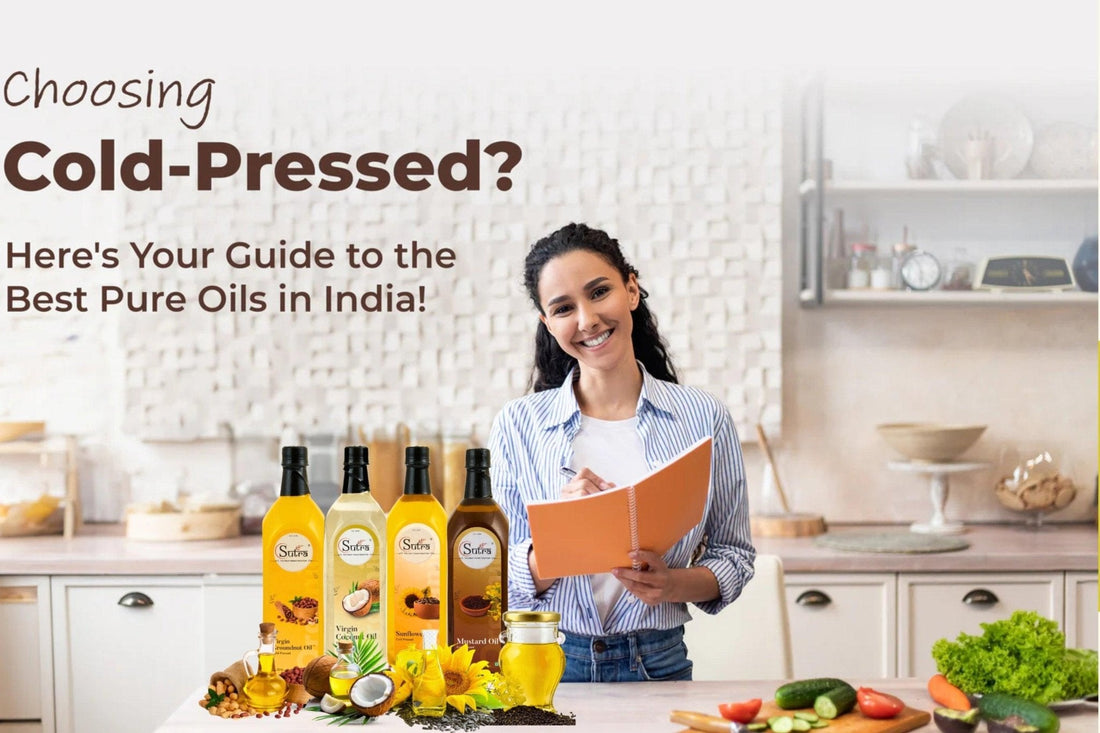Cold Pressed Oil Myths Debunked: Facts vs. Fiction - Sutrakart

The rise of "cold pressed oils" has come with a wave of information, and sometimes, misinformation. * Briefly state the goal: to clarify common myths surrounding cold pressed oils. * Thesis: This article will tackle prevalent misconceptions about cold pressed oils, presenting the facts to empower readers in making informed choices for "healthier daily cooking" with "Best cold pressed oil.
A Quick Refresher on the Cold Pressing Process * Explain the mechanical extraction, low heat, and lack of chemicals. * Distinguish from industrial refining (hot pressing). * Emphasize "Pure and natural Cold Pressed Oils" and "WOOD COLD PRESSED OIL."
III. Debunking Common Myths About Cold Pressed Oils
- Myth 1: Cold Pressed Oils Aren't Good for High-Heat Cooking.
- Myth 1: Not All Cold Pressed Oils Have Low Smoke Points
- The Fact: While some delicate oils do, others like "Cold Pressed oil Groundnut" and high oleic sunflower oil have reasonably high smoke points suitable for Indian cooking (e.g., sautéing, shallow frying).
- Nuance: Explain that it depends on the specific oil's fatty acid composition.
- Cold Pressed Cooking Oils, cooking oils.
Cooking with cold pressed groundnut oil in a hot pan-
Myth 2: All "Edible Oils" Labeled "Pure" Are the Same.
- Myth 2: "Pure" Doesn't Always Mean Unrefined & Cold Pressed
- The Fact: "Pure" on refined oils often just means no added ingredients, not that it's unrefined or cold-pressed. True purity comes from the extraction method.
- How to Spot Genuinely "Pure and natural Cold Pressed Oils": Look for terms like "cold pressed," "virgin," "unrefined," "wood pressed."
Comparison of a clear refined oil and a slightly cloudy cold pressed oil-
Myth 3: Cold Pressed Oils Are Too Expensive and Not Worth It.
- Myth 3: The Investment in Health Outweighs the Cost
- The Fact: While the initial cost might be higher, consider the long-term health benefits and higher nutritional value per serving.
- Cost-Effectiveness of Health: Compare it to medical costs or supplements.
- "Premium Unrefined Oils" Justify Their Value: Explain the quality and traditional process.
Cost comparison chart highlighting value of cold pressed oils- Myth 4: They Go Rancid Too Quickly.
- Myth 4: Proper Storage Extends Shelf Life of Cold Pressed Oils
- The Fact: While they are more sensitive to light and heat than refined oils due to retained nutrients, proper storage (cool, dark place, airtight container) can significantly extend their shelf life.
- Signs of Rancidity: How to tell if oil has gone bad.
Dark glass bottle of cold pressed oil in a cool pantry- Myth 5: Cold Pressed Oils Are Just a Fad.
- Myth 5: A Return to Tradition, Not a Fleeting Trend
- The Fact: "Wood Pressed Oils" (like ghani oils) have been used for centuries in India. The current popularity is a resurgence of traditional wisdom due to health awareness.
- Growing Demand for "Natural Groceries": Part of a larger movement towards natural, wholesome foods.
- Scientific Backing: Modern research supports traditional health claims.
Traditional Indian oil press (ghani)
Trusting Your Source for "Best cold pressed oil" * Emphasize Sutrakart's transparency and commitment to "Pure and natural Cold Pressed Oils." * Mention "Buy Stone and Wooden COld-pressed oils."
Conveniently "Buy Cold Pressed Oil Products Online in Bangalore" * Highlight accessibility and doorstep delivery.
* Summarize the importance of fact over fiction when choosing your "cooking oils." * Reiterate the benefits of choosing authentic cold pressed oils. * Call to action: Invite readers to explore Sutrakart's truly "Pure and natural Cold Pressed Oils" for a healthy kitchen.


